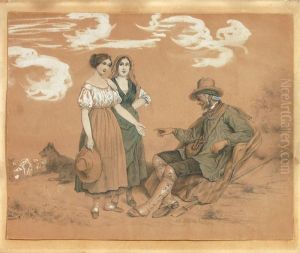Karl Eduard Biermann Paintings
Karl Eduard Biermann was a notable 19th-century German landscape painter, born in Berlin in 1803. His contributions to art are primarily marked by his adept skill in capturing the essence of nature, imbuing his landscapes with a sense of romanticism and realism that was characteristic of the era. Biermann's journey into the world of art began at an early age, influenced by the rich cultural milieu of Berlin, which was a hub for artists, musicians, and writers during this period.
He pursued his artistic education at the Prussian Academy of Arts in Berlin, where he studied under several prominent artists of the time. This formative period was crucial in shaping Biermann's stylistic development and his deep appreciation for the natural world. His landscapes are not just mere representations of nature; they are imbued with a sense of mood, atmosphere, and the sublime, reflecting the romantic spirit that pervaded much of the art produced during his lifetime.
Throughout his career, Biermann exhibited his works widely, gaining recognition and acclaim for his artistic prowess. His paintings were celebrated for their meticulous detail, vibrant color palette, and their ability to transport viewers to the scenes depicted. Biermann was particularly adept at capturing the changing lights of dawn and dusk, showcasing his skill in rendering light and shadow. His contributions to German landscape painting were significant, marking him as a key figure in the romantic movement in Germany.
Despite the changing tides of art movements over the years, Biermann remained dedicated to his vision, continuing to produce work that resonated with audiences for its beauty and emotional depth. He passed away in 1892, leaving behind a legacy that has continued to influence landscape painters. His works are preserved in several museums and collections, serving as a testament to his skill and dedication to the portrayal of nature's splendor.






